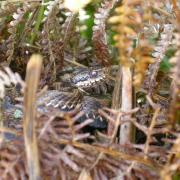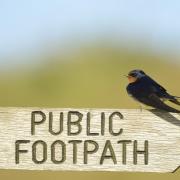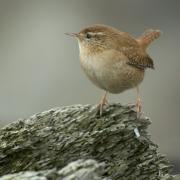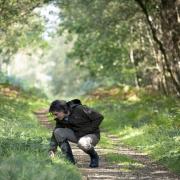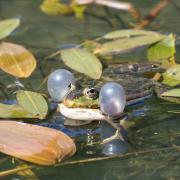Depending on what plans you have for the improvement and maintenance of your house, the discovery that you share your home with bats may be enough to send you hurtling nervously back down the loft ladder...
WITH its abundance of lush countryside and numerous period buildings, tourists are not the only visitors drawn back each year to Sussex. This county is perfect for the British Bat, it is also vital for its continued survival in this country.
Bats return to the same roosts year after year and just as this county has its mystery and folklore, so its bats carry their own myths. The main one being that they are unpleasant, unpopular pests. Bats, contrary to common belief, do not breed prolifically like mice, the female will usually have only one baby each year. They are very clean and spend hours grooming. They do not make nests or prevent you carrying out work on your property but you do have to plan it sympathetically. And they have a large fan base, especially in Sussex.
Heather McFarlane from the Bat Conservation Trust which operates a network of volunteers across the UK says: “Bat conservation in this country wouldn’t be possible without the dedication of our volunteers and local groups such as the Sussex Bat Group. Sussex is very important for bats in the UK and is home to some of our most elusive species making it one of the only counties where you can see all 17 bat species found in the UK. Watching bats hunt on a summer’s evening, seeing them dart across the dusky sky is mesmerising. Not to mention that a bat can easily consume 3,000 midges a night, making them natural insecticides and very handy in summer!”
So before you break out into a cold sweat over these tiny house mates you might also want to consider that British bats survive exclusively on a diet of mainly moths, mosquitoes, midges and beetles and in summer could make that early evening barbecue much more pleasant.
If you do have bats roosting in your property they are only going to be temporary, seasonal lodgers who will return to roost for the maternity period during May or June and then leave during July or August once the young are independent. They generally make little if any disturbance, they do not chew nor do they create entrance holes but just take advantage of existing gaps. Unlike mice their droppings are dry, crumbly, can be brushed up easily and will only be a seasonal rather than all year round annoyance.
And before you rush to cancel your builder for that roof job seek advice from your Statutory Nature Conservation Organisation. Usually there are ways around either house improvements or pest control that will suit both you and the bats.
Not all bats will choose to roost in a property many are just as happy in the garden either in tree holes or hollow trunks. If you do develop an interest you may like to consider a bat box which operates in much the same way as bird boxes.
The Tims family from Angmering inherited bats when they moved into their property fourteen years ago. Jane Tims said: “We enjoy seeing them flying around the garden. They’re different aren’t they, quite fascinating really. They don’t seem to create any mess, where we are is pretty rural anyway. We’ve had them for years. They don’t bother us and we don’t bother them. It’s quite a peaceful co-existence really.”
True Friends Of The Bat
Sue Harris from Bignor has worked as a bat volunteer for the last ten years. She is involved with The Sussex Bat Group, The Bat Conservation Trust and Natural England. She organises bat walks during the summer and several hibernation counts in the winter.
“It all started when we moved into our house which already had brown long-eared bats. I had always been fascinated, even as a child, by these mysterious creatures that sleep all day and hunt in total darkness.
“I started doing some voluntary and rescue work for the Sussex Bat Group and decided I wanted to work towards getting my licence. It takes about three years shadowing a trained bat worker to get your licence and you can’t enter peoples’ properties without one.
“What I love most is being able to provide help and advice to people. Some people are afraid of bats and lots think they won’t be able to do any work on their house. But they can as long as it’s undertaken sympathetically. Even people who initially aren’t too thrilled to discover they have bats are usually keen to find out more about them.
“I rarely come across anyone who is completely negative.”
The Sussex Bat Group has just celebrated well over 25 years of giving free help and advice on bats all over the county. Secretary Sheila Wright says “Sussex is one of the most important counties in the UK for bats. Apart from the the lesser horseshoe bat, it is a stronghold for some of the rarer species such as bechstein’s, barbastrelles and grey long-eared. It is also the only place in the UK where we have the greater mouse-eared bat.
“Two reasons Sussex is so popular with bats is the wonderful countryside with all these lovely mature oak trees and the architecture, lots of vertical and hanging tiles which of course bats love”
THE BAT BOX Q & A
Will I still be able to have work done in my loft or to my roof?
If you find you have bats this doesn’t mean you can’t have building work, roof repairs or timber treatment done but you do need to seek advice from your local Statutory Nature Conservation Organisation. They will send a trained bat worker out to assess the situation and give advice. Usually it is a case of getting the timing of the work right.
What do I do if I don’t want the bats?
If bats are causing problems or are unwelcome there is a range of opitions that can be taken but you must contact your local SNCO to discuss your particular situation. Bats and their roosts are protected by law.
Will the bats cause any damage?
Bats are not rodents. They do not nibble or gnaw wood, wires or insulation. They do not build nests or bring in bedding materials. If you do have belongings in the loft it is a good idea to cover them with dust sheets just to prevent the hassle of any droppings that may fall on them.
Will we get overwhelmed with bats and will we have them all year?
No. Female bats normally have only a single baby each year and sometimes not every year. Once the baby is independent they all move away. If bats find a roosting place that suits them they may return year after year but only for those several weeks in the summer. Bats need different conditions for breeding and hibernating or is it highly unlikely you will have them doing both in the one place.
What do I do if a bat gets inside the house?
Bats usually come and go from their roosts virtually unnoticed. On the rare occasion one turns up inside the house you are advised to avoid direct contact with them so wear gloves and either try to trap it gently in a towel or by putting a box or container over the top and sliding a piece of cardboard underneath. Release it outside away from houses, cats or dogs and preferably at dusk.
Bats and the law
You must not
Deliberately kill, injure, catch or keep batsDamage or destroy bat roostsDeliberately disturb bats e.g. by entering known roosts or hibernaculaSell, barter or exchange bats, alive or deadUseful ContactsThe Bat Conservation Trust operates the national Bat Helpline 0845 1300 228 www.bats.org.ukThe Sussex Bat Group 01903 810119 Contact Sheila Wrightwww.batbox.com for Bat detectors for amateurs and professionalsNatural England 0845 600 3078 www.naturalengland.org.ukThe Bat Conservation Trust operates the national Bat Helpline 0845 1300 228 www.bats.org.ukThe Sussex Bat Group 01903 810119 Contact Sheila Wrightwww.batbox.com for Bat detectors for amateurs and professionalsNatural England 0845 600 3078 www.naturalengland.org.uk



